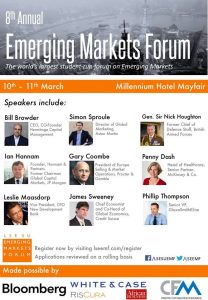Guy Cheatham
London School of Economics
London, England
Spring 2017
March 2017: EMs and the World
The recent weeks have arguably been the busiest thus far during my time here in London, primarily consisting of summative papers, presentations, and interviews, but the main highlight in which I want to discuss would be my experience at the 2017 LSE Emerging Markets Forum. Taking place at the Millennium Hotel in Grosvenor Square, the EMF is the largest event of its kind globally, and I had the pleasure of meeting and connecting with students from London, Europe, and areas outside of the continent. The purpose of the forum is given in the name itself, which was to discuss the future of developing economies in the coming decades, and how the current political and economic atmosphere will affect their development, in addition to approaches taken by investors in developed economies to these markets.
For those unfamiliar with Emerging Markets I will give a brief background on the subject. Emerging Markets are economies, mainly located in Asia, Africa, and Latin America in which are experiencing significant population growth, urbanization, and fast-paced industrialization, among other growth factors. They provide huge opportunities for installing lines of production due to cheap labor and growing populations, in addition to new markets for companies to expand to. The four largest EMs are the BRIC economies (Brazil, Russia, India, and China), and they are growing at significant rates (maybe not Russia at the moment). To put this growth into perspective, China’s rate of development is extraordinary; the soon-to-be largest economy is building cities in which will not be inhabited for at least a decade. The rate of urbanization in China is fast, yet that cannot even keep up with development. As an investor from a developed economy, it is easy to see why China, among other EMs, are attractive opportunities. Because of these growing economies, we are seeing a shift of wealth from north to south, and west to east, which will dramatically change the global economy in the coming decades.
The Forum opened with a series of questions, mainly concerned with Trump and Brexit, and the first question for the audience was rather bold: the opening speaker asked us to raise our hands if we thought that the EU would collapse within a decade, and over half of the room thought so. This moment reflects the changes seen in the international landscape, and many speakers would center their talks around uncertainty and how it will affect EMs in the coming years.
The speaking lineup at the forum was strong; it included Gary Coombe (President of Procter and Gamble Europe, who talked about gender equality in EMs), Simon Sproule (Vice President of Aston Martin, who talked about the role of the luxury auto industry in EMs), and Leslie Maasdorp (VP and CFO of New Development Bank). Other topics in the forum ranged from international security, global real estate, and central banking and macroeconomics. My experience at the forum came with the following takeaways:
it included Gary Coombe (President of Procter and Gamble Europe, who talked about gender equality in EMs), Simon Sproule (Vice President of Aston Martin, who talked about the role of the luxury auto industry in EMs), and Leslie Maasdorp (VP and CFO of New Development Bank). Other topics in the forum ranged from international security, global real estate, and central banking and macroeconomics. My experience at the forum came with the following takeaways:
Given the economic, political, and technological progress we have undergone in the previous 50 years, there is no reason that we should not be rational optimists about the future, despite the uncertainty we face today.
Expect new players to become key decision makers in the global in the near future. China will be the most important case, as its economy is will be 150% the size of the US economy by 2040, should current trends stay constant. Africa will also become an increasingly influential player on the global stage, as its population is expected to reach 2 billion by 2050. These economies will become key decision makers on the global stage; investors from developed economies will want to invest in areas of significant growth, and the world economy will become more integrated.
Whether or not one wishes to have a career relating to EMs, going to these countries is important, just in terms of meeting the people there, and seeing how their societies operate.
The third and last point came from Ian Hannam, former partner at JP Morgan and mining titan, a man who has made a fortune off EM investment. Hannam’s point about traveling is important; he told us at the EMF that it is one of the most important endeavours for young adults to take up, as it helps people understand where others come from, and how they developed their views. The EMF was a lovely experience; it taught me quite a bit on a topic I was not familiar with, in addition to how important EMs are for the future. I hope to learn more about developing economies more, as they become increasingly important to the future of the global economy.